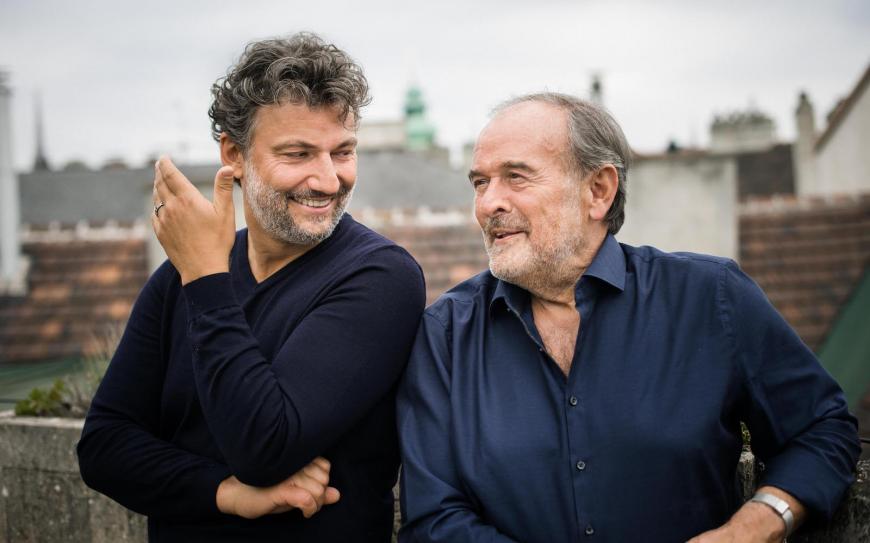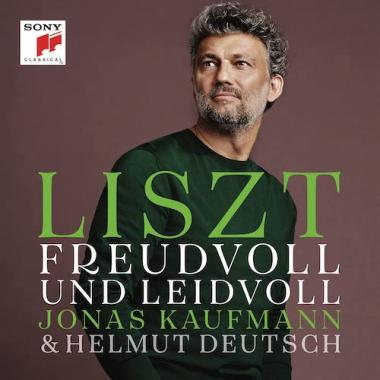
What better way for tenor Jonas Kaufmann to begin his latest recording, Liszt: Freudvoll und Leidvoll, than with the heroic declamation at the start of “Vergiftet sind meine Lieder” (My songs are poisoned), to lyrics by Heine? The glint in the voice thrills, offering promise of what is to come. And despite the unassailable fact that Kaufmann must work a mite harder to produce his coveted sound, especially when he sings softly at half voice in the title song, “Freudvoll und Leidvoll” (To be full of joy and full of sorrow) — a song whose lyrics by Goethe would have prompted a “why don’t you lie down and get comfortable” greeting had the poet lived long enough to have encountered Sigmund Freud — he is in significantly better voice than in his last recital, Selige Stunde, which he recorded just two months earlier.

Part of the difference may be due to the music itself, which rarely asks the tenor to skip lightly between notes as he moves up and down the scale. Yet another may be due to Helmut Deutsch’s flexible pianism, and the nigh perfect relationship between singer and long-term accompanist. I have, at times, lamented the tendency for Deutsch and his partners to interpret lieder in strict time, as though the German romantic spirit has been extinguished forever with the rise of Nazism. Here, however, Kaufmann and Deutsch are as free and “Lisztian” as one could possibly hope for. Nothing is routine, and nothing is taken for granted. Every phrase, every word is caressed (when tenderness is called for) or hurled with insight and intelligence.
The recording is also supremely thought through. The title song, for example, appears in two very different versions, the softly sung first setting, second version from 1844 and the very different second setting, probably from 1849. As was the case with some of Schubert’s settings, Liszt’s multiple visits to poetry produced vastly different responses. In the absence of a YouTube link to Kaufmann’s performance, which I hope will appear soon, please savor Diana Damrau’s rendition of the first setting, second version from her marvelous recital with Deutsch from a decade ago:
I expect I will not alone in considering this recital among the duo’s most successful lieder recordings of their long partnership ... even if you take into consideration the differences in emission and flow between Kaufmann’s live 2012 recording of the second setting from Vienna that he recorded in June 2020.
For readers who may hesitate at the thought of purchasing (or streaming) a complete Liszt recital, let’s recall how many of his 90 or so songs in five languages abound with irresistible melody. Take, for example, “O lieb, solang du lieben kannst” (O love as long as you can love) in a performance that reveals much about Kaufmann’s current vocal estate.
Then there’s the beautifully caressed “Es muss ein Wunderbares sein” (It must be something wonderful), a too-short exposition which is best auditioned when seated in a safe location, lest you find yourself melting into a puddle.
Throw in one of Liszt’s three Petrarch settings, “Pace Non Trovo” (I find no peace), which Leah Crocetto sang at the Cardiff Singer of the World finals, and some other gems that I’ll let you discover for yourself, and you’re likely to fall in love with many of the 20 songs on this recital. The sonics are anything but souped up — this was probably recorded in a living room — but the naturalness of sound, especially when heard in hi-resolution or hi-resolution MQA, hides nothing.
No, Kaufmann doesn’t attempt the beloved, extremely challenging, and supremely inward “O! Quand je dors” (Oh, when I sleep). His decision seems wise, given the song’s upward ascent to an extremely exposed floated high ending.
Which is not to suggest anything other that most Kaufmann admirers will not want to ascend to heaven before hearing his Liszt.




